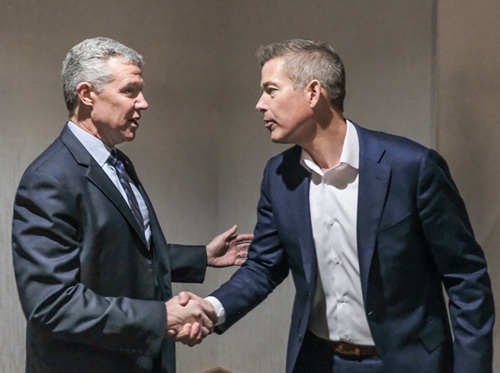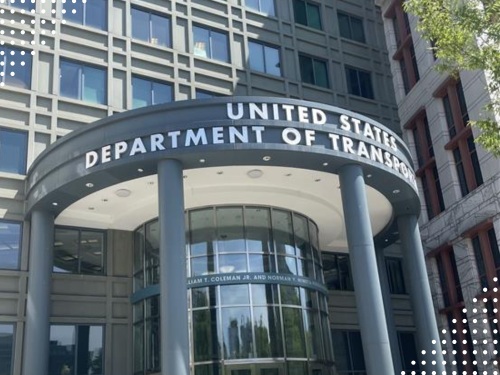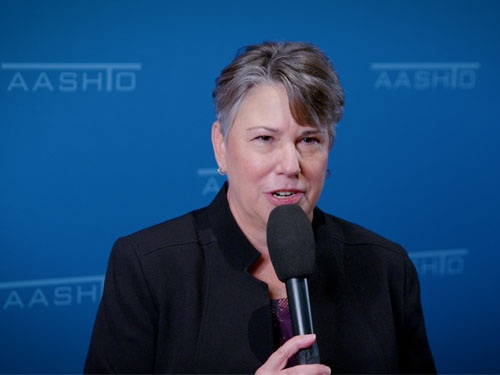The American Association of State Highway and Transportation Officials recently requested the U.S. Department of Transportation ensure an uninterrupted flow of federal approvals and funding to the states for federally supported transportation infrastructure projects.
[Above photo by AASHTO]
“These interruptions – whether directly or indirectly related to funding – have the effect of freezing essential construction and planning activities including those involving roadway and bridge projects,” noted AASHTO in a letter sent to USDOT Secretary Sean Duffy on March 4.
“Delays like these leave state departments of transportation at serious risk of losing the upcoming construction season for many projects,” the organization stressed. “This will not only add to overall costs to the American people but also deprive communities from receiving those economic, safety, and quality of life benefits.”

AASHTO pointed to the recent reaffirmation by USDOT for division offices of the Federal Highway Administration to continue processing routine planning approvals, including Statewide Transportation Improvement Program or STIP amendments, as an example of maintaining steady federal support for state infrastructure endeavors.
“AASHTO’s request to USDOT is to build upon this notion of holding state DOTs harmless from undue financial risk associated with federally funded projects,” the organization stressed. “[That] continued stable federal investment support unleashes the economic and quality of life benefits of critical transportation investments being made each day by our nation’s state DOTs.”
As an important example of necessary federal support, However, AASHTO also emphasized that all federal dollars committed to state DOTs through formula programs and executed grants represent legally binding obligations.
“These programs are reimbursable programs, where state DOTs pay contractors for completed work and then seek reimbursement from USDOT,” the organization pointed out. “In order to avoid unexpected cash flow challenges for state DOTs, we request reimbursement requests be paid immediately for construction and related costs already incurred, including projects that utilize and have received prior federal approval for advance construction.”
Additionally, AASHTO asked USDOT’s Duffy to restore full access to the FHWA’s Financial Management and Information Systems or FMIS to allow processing of all obligation and reimbursement requests as states have already committed their own funding, meaning delays in processing are creating growing cash flow issues.
AASHTO also asked USDOT to resume environmental reviews for transportation projects as that, too, is contributing to project delays.
“Due to USDOT’s pause on signing environmental documents pertaining to NEPA [the National Environmental Policy Act], state DOTs are at risk of project schedules slipping and construction seasons missed,” the organization noted. “Continued failure to advance standard environmental documents will result in missing the upcoming construction window altogether for many different types of investments, including critical interstate highway facilities.”
While AASHTO stressed that it “has many ideas” to speed up projects through a reform of environmental review and permitting, USDOT needs to do all it can in the meantime to provide clear guidance to state DOTs and avoid further delaying project development activities that represent “shared priorities” with state DOTs.
Finally, AASHTO called on USDOT to restart the flow of apportioned formula funds to states as part of the National Electric Vehicle Infrastructure or NEVI program, as states have made awards and entered contracts – “multiyear contracts in some cases,” the organization said – with the private sector based on five years of predictable funding apportioned by the Infrastructure Investment and Jobs Act or IIJA.
“Restoring the flow of NEVI funding will allow states to honor the commitments they have already made based on the formula funding authorized by Congress in the IIJA,” AASHTO said.
 Top Stories
Top Stories
USDOT Makes $1.5B Worth of BUILD Grants Available
December 19, 2025 Top Stories
Top Stories

